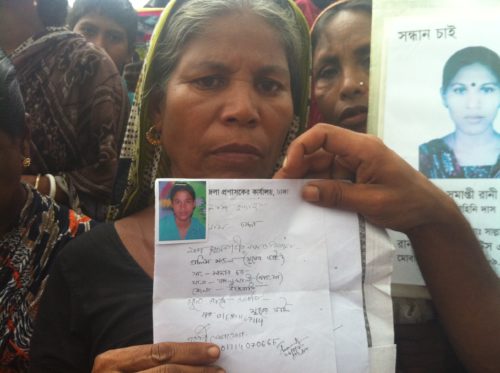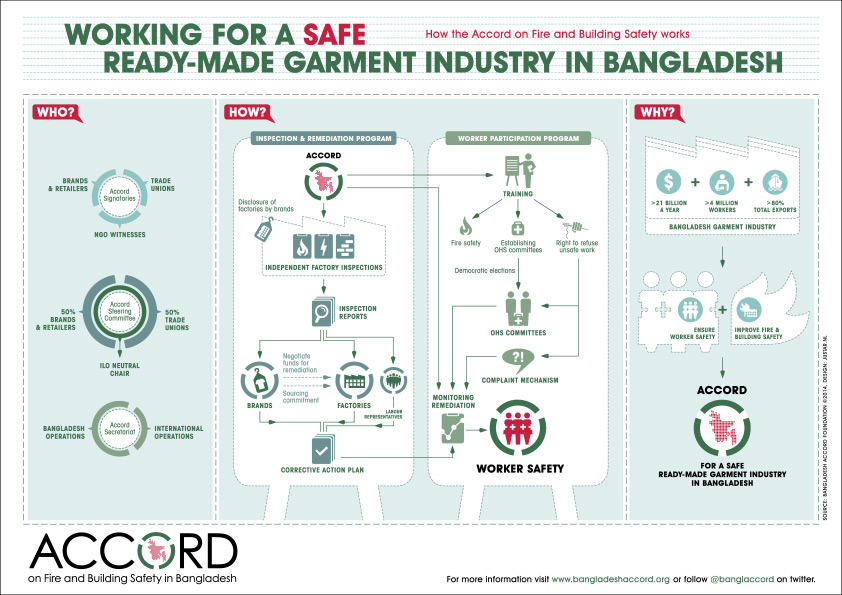On the morning of April 24, 2013, the 9-story Rana Plaza building in Bangladesh collapsed, killing 1,138 workers and injuring more than 2,000. It was the deadliest disaster in the history of the modern garment industry.
Before its collapse, the building had housed five garment factories, producing clothing for well-known Western brands, including Walmart, JCPenney, The Children’s Place, Inditex (owner of Zara), Loblaw, Primark, and many others. Virtually all of these companies had developed “robust” standards for suppliers and purported to vigorously monitor these standards using teams of in-house staff and outside for-profit auditing firms to inspect their factories on a regular basis. Yet none of these massive corporations with millions of dollars at their disposal identified or took steps to correct the fundamental structural flaws that led to the collapse.
Though it dwarfed other disasters with its scale, Rana Plaza was neither the first nor the last deadly accident in the Bangladesh garment industry. Since 2005, more than 2,000 workers have been killed in factory fires and building collapses, a fact that brands sourcing from that county knew but refused to acknowledge. failing to inspect their supplier factories for critical safety features such as fire exits and proper electrical wiring.
In 2010, after a fire at the That’s It Sportswear factory killed 29 workers who had sewn clothing for the Gap, Osh-Kosh, VF Corporation and PVH Corp. (owner of Calvin Klein and Tommy Hilfiger), a group of advocates, including the Worker Rights Consortium, International Labor Rights Forum, Clean Clothes Campaign, Maquila Solidarity Network, and the global union federation Industriall, came together to propose a program that would require brands to make a binding, enforceable commitment to identify and address safety violations at their Bangladesh suppliers. The first company to sign was PVH Corp., which agreed to do so under mounting public pressure after an ABC News story exposed how little the company knew about its own supply chain. The only other company to sign was Tchibo, a German retailer. Despite months of back and forth negotiations, the Gap ultimately refused to sign, citing an unwillingness to make such commitments binding.
Launch of Initial Accord on Fire and Building Safety in Bangladesh
It wasn’t until the Rana Plaza collapse in 2013 that media and consumer pressure led additional companies to sign on to a modified version of the original agreement. A massive global campaign, focused first on H&M and then on several of its competitors, built on the public outrage consumers felt over the deaths, coupled with the reality that such a disaster might well have been prevented. The new agreement was called the Accord on Fire and Building Safety in Bangladesh (“the Accord”).

Bangladeshi families demand death benefits and compensation for workers killed or injured in the 2013 Rana Plaza building collapse.
In May 2013, the Accord launched with 43 corporate signatories from 13 different countries and 10 labor signatories, including 2 global union federations and 8 Bangladesh federations. It was an unprecedented agreement, in which companies committed to do the following:
- Require supplier factories to undergo independent inspections by qualified fire, building and electrical safety engineers, the results of which would be made publicly available. For many factories, this would be the first time that a qualified safety expert had ever set foot inside the building;
- Require suppliers to implement all necessary corrective actions to address the hazards identified by the inspectors, and do so by specific deadlines. Accord engineers would carry out regular follow-up inspections to ensure that repairs were done correctly and maintained over time;
- Provide financial support, in the form of increased prices, low-cost loans, or direct payments for renovations to allow factories to be able to afford to make the repairs necessary to operate safely;
- Maintain a long-term sourcing relationship with Bangladesh;
- Terminate business relations with suppliers that refused to address safety violations identified by Accord inspectors. Such economic consequences for non-compliance are critical to enforcement of the agreement at the factory level;
- Require suppliers to provide access for independent trainers on occupational safety and labor rights. The program also provides for an independent complaint mechanism through which workers can alert the Accord about potential safety violations without fear of reprisal; and
- Unlike existing multi-stakeholder initiatives and corporate social responsibility programs, the Accord is a legally binding and enforceable agreement, in which brands are obligated to implement their commitments under the program. The program is governed by a 7-member Steering Committee, made up of 3 brand representatives, 3 union representatives, and a neutral chairperson appointed by the International Labor Organization (ILO). Regular reports of the program’s progress, as well as a list of covered factories and inspection reports, are available on the Accord’s website.
The Accord has had a tremendously positive impact on safety conditions in the Bangladesh garment industry. Since its inception in 2013, Accord inspectors have identified more than 122,000 safety violations at covered factories. As of October 2018, the overall rate of safety hazards identified in the original round of inspections that have been reported or verified as fixed had reached 90%. More than 470 factories had fully remediated all violations and 934 factories had completed at least 90% of the required repairs and renovations. More than 300 joint labor-management Safety Committees have been created and trained to monitor safety conditions on an ongoing basis and the Accord’s complaint mechanism has resolved more than 290 safety complaints from workers and their representatives.
Expansion to Pakistan
In December 2022, the Pakistan Accord on Health & Safety in the Textile & Garment Industry (‘Pakistan Accord’) was announced. This expansion came after a feasibility assessment evaluating priority countries for possible expansion launched in 2021.
The Pakistan Accord covers all Cut-Make-Trim (CMT) facilities, namely Ready-Made Garments (RMG), home textile, fabric, and knit accessories suppliers producing for Accord signatory companies. Additionally, fabric mills in Pakistan that are within the supply chains of the signatories are covered.
The Pakistan Accord builds on key elements of the International Accord including:
- Independent inspections and remediation of fire, electrical, structural and boiler safety hazards
• High level of transparency on a factory-by-factory basis
• Provisions to ensure remediation is financially feasible
• Safety Committee training and safety awareness program
• Respect for freedom of association in relation to protecting worker safety
• An independent worker complaints mechanism
• Joint capacity building with the government of Pakistan
The Pakistan Accord took effect on 1 January 2023 and will run until December 2025 with the possibility of renewal.
Ongoing Renewal and Expansion of the International Accord
In November 2023, the agreement was renewed through December 2026, with a provision for an automatic renewal for an additional three years. The renewed International Accord is a legally binding framework agreement under which Country-Specific Safety Programs (CSSPs) will be implemented in Pakistan and through the RMG Sustainability Council (RSC) in Bangladesh, with the provision to develop future health and safety programs in other major garment-producing countries based on feasibility and expansion criteria.
The agreement has set an important precedent for the scale of improvement that can be accomplished under the WSR model and the power that workers can achieve to address abuses that may seem insurmountable.
Fact Sheet: Accord on Fire and Building Safety in Bangladesh (PDF)
Hoja de Información: Acuerdo sobre Incendios y la Securidad de Edificios en Bangladesh (PDF)
